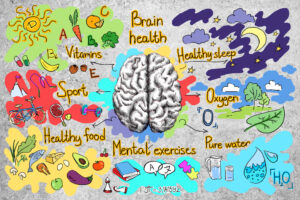Is your doctor truly looking out for your well-being, or simply masking your symptoms with a quick prescription? In today’s fast-paced medical world, many healthcare providers are quick to reach for the prescription pad, often without asking the most basic but vital questions: How are you sleeping? What does your diet look like? Are you exercising? These factors, which are foundational to our health, are frequently overlooked in favor of a faster, pharmaceutical solution.
But here’s the uncomfortable truth: If your doctor isn’t prioritizing your sleep and diet, you might not be seeing a healer – they might be more of just a legal drug dealer. While this statement may sound extreme, it raises an important question about the state of modern medicine. Are we addressing the root causes of our health problems, or are we merely silencing the symptoms with a pill?
In this blog, we’ll explore the critical role of sleep and diet in men’s health, the dangers of prescription-first medicine, and how to recognize when your doctor is truly advocating for your well-being – or just acting like a drug dealer. The truth about your prescriptions may surprise you.
The Critical Role of Sleep in Men’s Health
When was the last time your doctor really looked into how well you were sleeping? When was the last time they even asked you about sleep at all? Sleep is often dismissed as a secondary concern, but in reality, it’s one of the most crucial aspects of maintaining optimal health. Poor sleep isn’t just about feeling groggy or unfocused – it’s a significant risk factor for a range of serious health issues that are seriously affecting men.
dismissed as a secondary concern, but in reality, it’s one of the most crucial aspects of maintaining optimal health. Poor sleep isn’t just about feeling groggy or unfocused – it’s a significant risk factor for a range of serious health issues that are seriously affecting men.
The Science of Sleep
Sleep is the body’s natural repair process. During deep sleep, your body goes to work, repairing tissues, producing hormones, and consolidating memories. When you’re not getting enough quality sleep, this repair process is disrupted, leading to a cascade of negative health effects. Research has shown that chronic sleep deprivation can lead to weight gain, weakened immune function, increased risk of heart disease, and even a higher likelihood of developing type 2 diabetes.
For men, the consequences can be even more severe. Testosterone production, which typically peaks in the early morning, is directly affected by sleep quality. Low testosterone levels are linked to decreased muscle mass, lower libido, and even depression. Yet, despite the clear connection between sleep and overall health, it’s unfortunately rare for doctors to look deeply into a patient’s sleep habits.
Sleep and Mental Health
 Beyond physical health, sleep is closely tied to mental well-being. Men are already at a higher risk for mental health issues like depression and anxiety, and poor sleep only exacerbates these problems. A lack of sleep increases stress levels, impairs cognitive function, and can even contribute to mood disorders. Studies have shown that improving sleep quality can lead to significant improvements in mental health, often without the need for medication.
Beyond physical health, sleep is closely tied to mental well-being. Men are already at a higher risk for mental health issues like depression and anxiety, and poor sleep only exacerbates these problems. A lack of sleep increases stress levels, impairs cognitive function, and can even contribute to mood disorders. Studies have shown that improving sleep quality can lead to significant improvements in mental health, often without the need for medication.
So why is it that so many doctors fail to address sleep as a primary factor in their patients’ health? The answer might lie somewhere in the convenience of prescribing a quick fix. But as we’ll explore further, treating the symptom rather than the cause is a recipe for long-term health problems.
Sleep Tips
Figured we might as well offer a few basic tips on sleep while we’re here.
So listen, improving your sleep quality doesn’t always require drastic changes. Small adjustments and tending to the basics can often make a significant difference in how well you sleep and, by extension, how you feel overall. Here are a few topline tips:
- Establish a Consistent Sleep Schedule: Going to bed and waking up at the same time every day, even on weekends, helps regulate your body’s internal clock, making it easier to fall asleep and wake up naturally.
- Create a Restful Sleep Environment: Your bedroom should be a sanctuary
 for sleep. Keep it cool, dark, and quiet. Consider using blackout curtains, earplugs, or a white noise machine if necessary. A comfortable mattress and pillows are also crucial for a good night’s sleep.
for sleep. Keep it cool, dark, and quiet. Consider using blackout curtains, earplugs, or a white noise machine if necessary. A comfortable mattress and pillows are also crucial for a good night’s sleep. - Limit Screen Time Before Bed: The blue light emitted by phones, tablets, and computers can interfere with your body’s production of melatonin, the hormone that regulates sleep. Try to avoid screens for at least an hour before bed. Instead, unwind with a book or some light stretching.
- Watch What You Eat and Drink: Avoid heavy meals, caffeine, and alcohol close to bedtime. Caffeine can stay in your system for hours, keeping you awake, while alcohol, although it may make you sleepy initially, can disrupt your sleep cycle through the night.
The Importance of Nutrition for Optimal Health
 If you are what you eat, then your diet is a direct reflection of your overall health. Unfortunately, in the hustle of modern life, diet often becomes an afterthought. Fast food, processed snacks, and sugary drinks have become staples in the average diet, leading to a host of health problems that could be easily prevented with better food choices. Yet, when it comes to addressing the issues of modernity, many doctors still reach for their prescription pads instead of discussing dietary changes.
If you are what you eat, then your diet is a direct reflection of your overall health. Unfortunately, in the hustle of modern life, diet often becomes an afterthought. Fast food, processed snacks, and sugary drinks have become staples in the average diet, leading to a host of health problems that could be easily prevented with better food choices. Yet, when it comes to addressing the issues of modernity, many doctors still reach for their prescription pads instead of discussing dietary changes.
The Impact of Your Diet
Diet plays a fundamental role in every aspect of health – from energy levels and physical performance to disease prevention and longevity. For men, maintaining a balanced diet is crucial for supporting muscle growth, managing weight, and reducing the risk of chronic diseases such as heart disease, diabetes, and certain types of cancer. However, a diet rich in processed foods, refined sugars, and unhealthy fats does the exact opposite, contributing to obesity, inflammation, and metabolic disorders.
But diet isn’t just about avoiding the bad – it’s about nourishing your body with the good. Nutrient-rich foods provide the vitamins, minerals, and antioxidants your body needs to function optimally. For instance, omega-3 fatty acids found in fish can help reduce inflammation and support heart health, while fiber-rich foods like fruits, vegetables, and whole grains promote digestive health and can lower the risk of certain cancers.
Nutrient-Rich Foods to Focus On
A healthy diet for men should focus on whole, unprocessed foods that deliver the maximum nutritional benefit. Lean proteins from healthy sources such as chicken, beef, wild game, and fish are essential for muscle maintenance and repair. Healthy fats, found in avocados, nuts, and olive oil, support brain function and hormone production. Complex carbohydrates, like those found in sweet potatoes, fruit, rice, and oats, provide long-lasting energy without spiking blood sugar levels.

In contrast, diets high in refined sugars and processed carbohydrates can lead to insulin resistance, weight gain, and increased risk of metabolic syndrome. Simply put, the foods you choose can either be your greatest ally or your worst enemy when it comes to health.
Simple Dietary Changes for Long-Term Health
The good news is that making healthier dietary choices doesn’t have to be complicated. Start by incorporating more whole foods into your meals, such as fresh vegetables, fruits, lean meats, and healthy sources of carbs. Meal prepping can also be a game-changer, allowing you to control portion sizes and avoid the temptation of unhealthy convenience foods.
Small, consistent changes can lead to significant improvements over time. For example, swap out sugary snacks for nuts or fruits, replace white bread with whole grain alternatives or traditional sourdough, and opt for water or herbal teas instead of soda. These simple changes can help reduce your reliance on medications by addressing the root cause of many common health issues – diet.
The Dangers of Prescription-First Medicine
While sleep and diet are fundamental pillars of good health, they are often overlooked in favor of a quicker, easier solution: prescription medications. The problem with this approach is that it treats symptoms rather than addressing the root cause of health issues – it’s like putting a piece of tape over the check engine light of your car because the light is annoying. This is where the distinction between a healer and a “legal drug dealer” becomes evident.
Overprescription in Men’s Health
The statistics are alarming. In the United States, nearly half of all adults are on at least one prescription medication, and men are frequently prescribed drugs for issues like high blood pressure, cholesterol, and mental health concerns. These medications can be life-saving interventions in certain situations, but when they are prescribed without considering a patient’s lifestyle, they can become a crutch rather than a cure.
least one prescription medication, and men are frequently prescribed drugs for issues like high blood pressure, cholesterol, and mental health concerns. These medications can be life-saving interventions in certain situations, but when they are prescribed without considering a patient’s lifestyle, they can become a crutch rather than a cure.
For example, rather than exploring why a man has high blood pressure – perhaps due to poor diet, lack of exercise, or chronic stress – a doctor might simply prescribe antihypertensive drugs. This approach not only fails to solve the underlying problem but can also lead to a dependence on medication and a false sense of security. The real issue – whether it’s an unhealthy diet, insufficient sleep, or unmanaged stress—remains unaddressed and continues to affect overall health.
When Pharmaceuticals Mask the Problem
Medications can offer quick relief, but they often come with a trade-off. Many drugs have side effects, some of which can be severe. For instance, statins, commonly prescribed to lower cholesterol, can cause muscle pain, digestive problems, and even increase the risk of developing diabetes. Antidepressants, another commonly prescribed drug, can lead to weight gain, sexual dysfunction, and emotional blunting.
Medications often mask the symptoms of a deeper problem. A pill might lower your blood pressure, but if the root cause – such as poor diet or chronic stress – isn’t addressed, you’re merely putting a band-aid on a wound that requires more comprehensive care. Over time, this can lead to a cycle of increasing medication dosages or the need for additional drugs to manage the side effects of the initial prescription.
The Value of a Holistic Approach
A holistic approach to health recognizes that our bodies are complex systems where everything is interconnected. By focusing on sleep, diet, exercise, and mental well-being, you can often manage or even reverse many health conditions naturally. This doesn’t mean that medications don’t have their place – they can be useful in certain circumstances – but they should be considered a last resort and a short-term intervention, not the first line of defense and certainly not something to rely on indefinitely.
For example, studies have shown that lifestyle changes like adopting a Mediterranean diet, increasing physical activity, and improving sleep quality can significantly reduce the need for blood pressure or cholesterol medications. Similarly, cognitive-behavioral therapy (CBT) and exercise have been proven to be as effective as antidepressants for many people with mild to moderate depression.

The key is finding a healthcare provider who looks beyond the prescription pad and considers the whole picture of your health. This is where the distinction between a true doctor and a “drug dealer” becomes clear: one is committed to your long-term well-being, while the other is merely treating your immediate symptoms.
Final Thoughts
In the modern healthcare landscape, it’s all too easy for doctors to reach for the prescription pad rather than diving deep into the root causes of health issues. But as we’ve explored, there are several other things that need to be addressed first.
Sleep and diet are two prime examples that are absolutely foundational to men’s health, playing critical roles in everything from physical fitness and mental well-being to disease prevention and longevity. When these vital aspects of your life are overlooked in favor of quick pharmaceutical fixes, it’s time to question whether your doctor is truly serving your best interests – or just acting as some sort of legal drug dealer.
your doctor is truly serving your best interests – or just acting as some sort of legal drug dealer.
Medications have their place, and there are definitely situations where they are useful or even life-saving. However, they should never be the first line of defense, especially when simple, effective lifestyle changes could address the underlying problem. Prioritizing sleep, improving your diet, and making informed choices about your health can lead to significant, lasting improvements without the dependency or side effects that often come with pharmaceuticals.
Ultimately, your health is your responsibility and yours alone. We all have to be proactive, seek out healthcare providers who take a holistic approach, and never settle for a one-size-fits-all prescription. By demanding more from your doctor and taking control of your health, you’re not just managing symptoms – you’re building a foundation for a healthier, happier life.


 for sleep. Keep it cool, dark, and quiet. Consider using blackout curtains, earplugs, or a white noise machine if necessary. A comfortable mattress and pillows are also crucial for a good night’s sleep.
for sleep. Keep it cool, dark, and quiet. Consider using blackout curtains, earplugs, or a white noise machine if necessary. A comfortable mattress and pillows are also crucial for a good night’s sleep.





